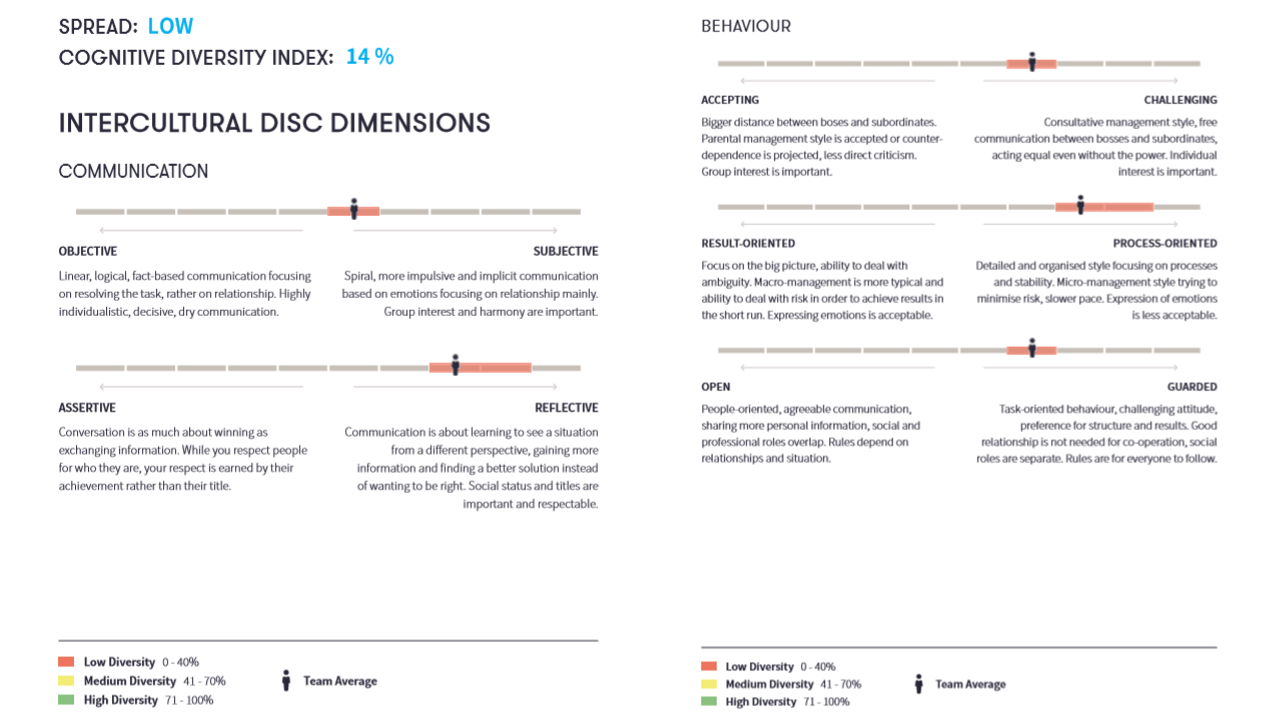The answer might surprise you as it is something that most of us are part of…in a company or even in our private life. No, it does not mean that anyone called you gay…(I had that reaction before…even though nothing would be wrong with that), it just means that we hang out with people who think like us even if they look very different.
Why is it important? Because this is the reason why most intercultural, D&I initiatives fail or cause more issues than they address. Most companies focus on the superficial layer of diversity such as nationalities, genders, generations, etc, the one that has NO proven benefit…If you invested in intercultural training and you learned about only nationalities and generations, ask for refund. The type of diversity that makes a real difference is COGNITIVE DIVERSITY. The way people think and process information. Yes, there might be some overlap between the 2 layers, but more often than not, there is not…
Let me show you an example before I explain it:
This Intercultural DISC team report is from a group of leaders at a global company. 10 people from 8 countries and 3 continents…on the surface they are very diverse, deep inside, they are pretty similar…how is that possible? It is simple…we like and trust people who are similar to us and/or who act and think in a familiar and predictable way. Imagine that you are recruiting employees…who are you going to offer a job to…
- somebody who looks like you, nothing too exotic, but he/she keeps disagreeing with you on every topic…or…
- somebody who looks very different to you, but you hit it off immediately or at least you don’t make you feel that everything you consider right is wrong…?
Most people would go for the second option as they could tick so many boxes:
- they could publish the statistics on the website proving that they are a multicultural, open-minded and inclusive company with X% of women, minorities, nationalities, etc…
- the new person could perfectly fit in, no arguments, no weird ways of doing things, it feels comfortable and familiar.
What is not to like, it sounds great?! The benefits of diversity stems from the wide range of perspectives which allows companies and people to see the same situation from several angles so they can make a better, more informed decision. That is called cognitive flexibility. That is NOT the case here. On the surface they seem to be a diverse team, in reality, beneath the surface, they are very similar…hence the lack of proven benefit of that type of diversity. It is like having a fleet of similar cars in a wide range of colours…
Homophily from Ancient Greek ὁμοῦ (homou, “together”) and Greek φιλία (philia, “friendship”) is the tendency of individuals to associate and bond with similar others, as in the proverb “birds of a feather flock together”. The presence of homophily has been discovered in a vast array of network studies. More than 100 studies that have observed homophily in some form or another came to the conclusion that similarity breeds connection as commoncharacteristics (beliefs, values, education, etc.) make communication and relationship formation easier.
Even neuroscience confirms it…culture shock does not happen because the buildings and traditions are different to what we are used to. It happens because our brain is pushed out of the comfort zone, it no longer recognises the patterns and it is forced to learn which takes up too much energy. Our brain is 2% of our body weight, but it uses 20% of our energy…that is why it is designed to create mental shortcuts (biases, habits) so it can run efficiently.
Cognitive diversity is uncomfortable and tiring…it can be annoying, shocking and frustrating, that is why it gets us out of the auto-pilot mode. We don’t get stronger in the gym, we just cause micro-damages to our muscle, we get stronger when we get home, eat, have a rest and recover. If we can re-frame the meaning of being uncomfortable to realising we are getting stronger, smarter and more adaptable, then we can significantly reduce our stress level while simultaneously increase the amount of productivity and fun we experience.
Csaba Toth
Latest posts by Csaba Toth (see all)
- The Power Of Seeing Progress And Making A Difference - 01/29/2025
- The Human Side Of AI: A Threat Or Opportunity? - 01/29/2025
- The Magic Of Leadership—And The Science Behind It - 01/29/2025
Copyright © 2018 ICQ Global. All Rights Reserved.


